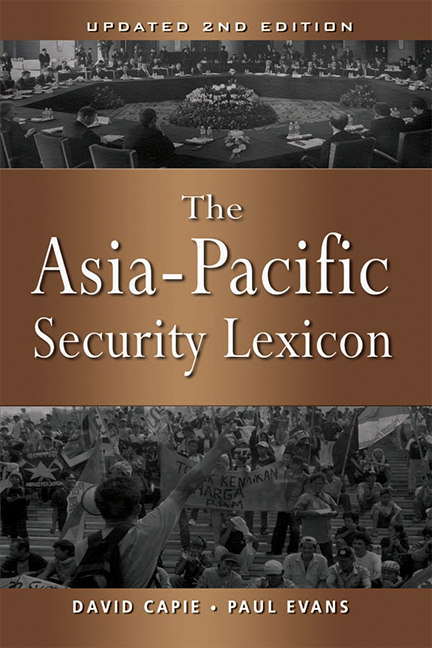Book contents
- Frontmatter
- Contents
- Abbreviations
- Introduction to the Second Edition
- Ad Hoc Multilateralism
- A la Carte Multilateralism
- The “ASEAN Way”
- Balance of Power
- Bilateralism
- Coalition of the Willing
- Coercive Diplomacy
- Collective Defence
- Collective Security
- Common Security
- Comprehensive Security
- Concert of Powers
- Concerted Unilateralism
- Confidence-Building Measures
- Confidence- and Security-Building Measures
- Constructive Intervention
- Cooperative Security
- Engagement
- Flexible Consensus
- Human Security
- Humanitarian Intervention
- Middle Power
- Multilateralism
- Mutual Security
- New Security Approach
- Non-Traditional Security
- Open Regionalism
- Peaceful Rise
- Pre-emption and Preventive War
- Preventive Diplomacy
- Security Community
- Terrorism
- Track One
- Track One-and-a-Half
- Track Two
- Track Three
- Transparency
- Trust-Building Measures
- About the Authors
Track Two
Published online by Cambridge University Press: 21 October 2015
- Frontmatter
- Contents
- Abbreviations
- Introduction to the Second Edition
- Ad Hoc Multilateralism
- A la Carte Multilateralism
- The “ASEAN Way”
- Balance of Power
- Bilateralism
- Coalition of the Willing
- Coercive Diplomacy
- Collective Defence
- Collective Security
- Common Security
- Comprehensive Security
- Concert of Powers
- Concerted Unilateralism
- Confidence-Building Measures
- Confidence- and Security-Building Measures
- Constructive Intervention
- Cooperative Security
- Engagement
- Flexible Consensus
- Human Security
- Humanitarian Intervention
- Middle Power
- Multilateralism
- Mutual Security
- New Security Approach
- Non-Traditional Security
- Open Regionalism
- Peaceful Rise
- Pre-emption and Preventive War
- Preventive Diplomacy
- Security Community
- Terrorism
- Track One
- Track One-and-a-Half
- Track Two
- Track Three
- Transparency
- Trust-Building Measures
- About the Authors
Summary
According to Louise Diamond and John McDonald, the term was invented in 1982 by Joseph Montville of the Foreign Service Institute to describe “methods of diplomacy that were outside the formal governmental system”. According to their definition, Track Two refers to the “non-governmental, informal and unofficial contacts, and activities between private citizens or groups of individuals, sometimes called citizen diplomats or nonstate actors.” Its basic premise is the assumption that “the expertise for dealing successfully with conflict and peacemaking does not reside solely within government personnel or procedures.”
In the literature on Asia-Pacific security, Track Two (or the Second Track as it is often called) is the “unofficial” channel for political, economic, and security dialogue in the region. Secondtrack meetings and organizations are typically made up of scholars, journalists, and occasionally politicians, as well as civilian and military officials acting in their “private” or “unofficial” capacities. As Pauline Kerr notes, Track Two in the Asia-Pacific is better described as an unofficial rather than nongovernmental channel, because
it is difficult to label organizations or individuals as “government” or “non-government.” Membership of forums and organizations is usually described as being “mixed” or “blended”, in that the participants include academics, other intellectuals, and government officials, usually from foreign ministries and occasionally from defence ministries, attending in their “private capacities” …. In addition, some “academic” members have a number of identities: also holding government and industry positions or acting as regular policy consultants to governments. Some come from institutes which, despite being labelled non-governmental, are government funded and in some cases the research arm of foreign and defence ministries.
The second-track process is based upon principles of informality, inclusivity, and non-attribution, in order to encourage frank debate and openness by the participants. It works from the assumption that the unofficial status of the meetings will permit the discussion of subjects that might be considered too sensitive or controversial for official discourse or formal negotiations. Track Two encourages the floating of “trial balloon” policy proposals and “has helped establish building blocks for supporting cooperative arrangements at the official level”.
- Type
- Chapter
- Information
- The Asia-Pacific Security Lexicon (Upated 2nd Edition) , pp. 233 - 236Publisher: ISEAS–Yusof Ishak InstitutePrint publication year: 2007



